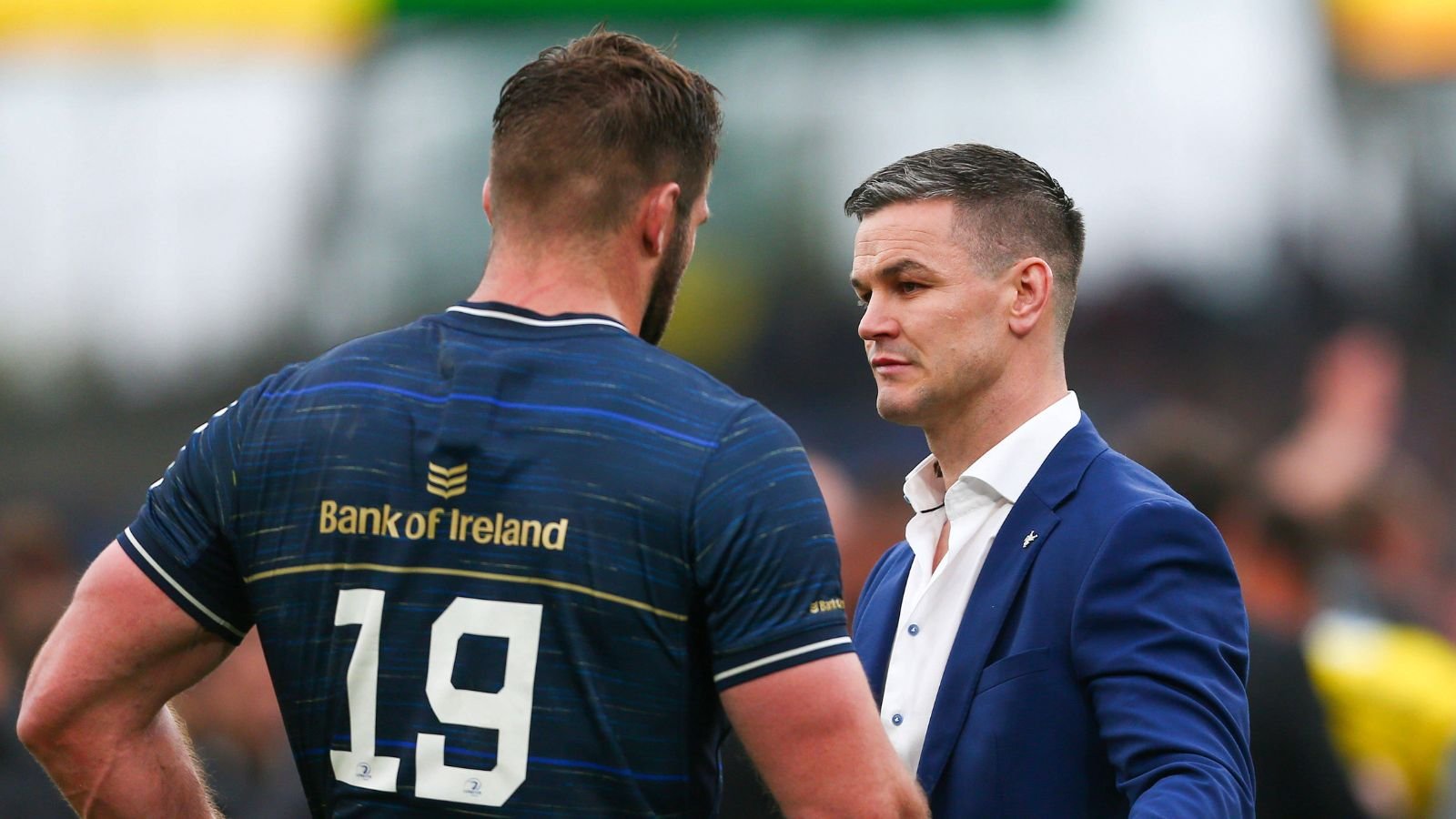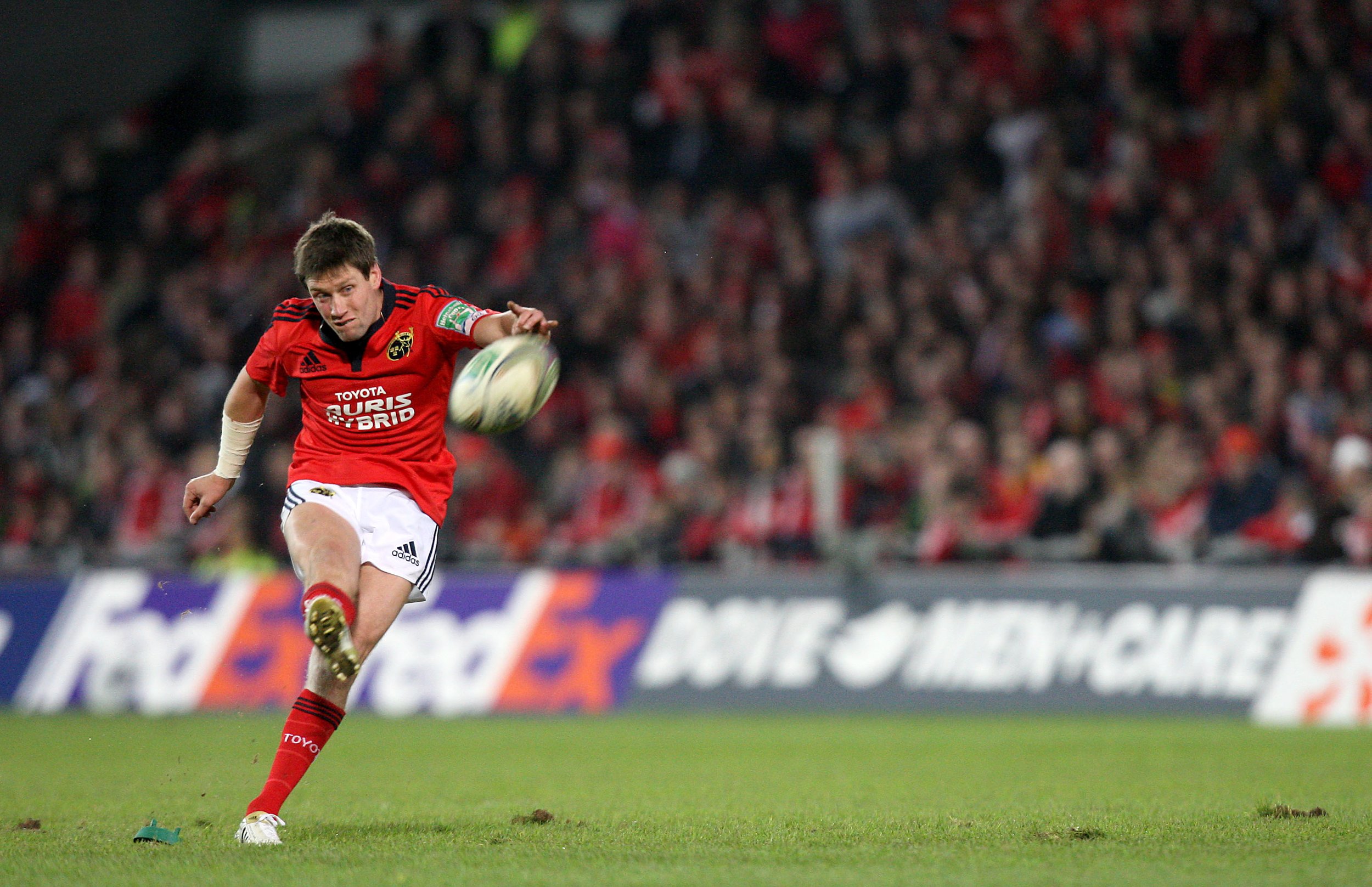Johnny Sexton’s ban: How does fly-half’s referee abuse suspension measure up?
Sexton faced disciplinary proceedings after an outburst at match officials following Leinster’s Champions Cup final loss to La Rochelle (Credit: Getty)
After a lengthy deliberation, Ireland talisman Johnny Sexton has escaped suspension from the Rugby World Cup.
The fly-half has faced a protracted disciplinary process after being accused of abusing referee Jaco Peyper during a heated exchange following Leinster’s defeat in the European Champions Cup final in May.
Charged with misconduct for his actions, Sexton was made to wait for his fate. He, and the Irish rugby public, sweated on the verdict, knowing that a dim view of his actions from the European Professional Club Rugby body (ECPR) could see him miss out on the World Cup.
This would not only damage Ireland’s confidence that they can finally deliver on their potential at World Cup time, but also rob a legend of the game of his swansong.
However, they sweated for nought - Sexton was ultimately handed a three-game ban, which sees him miss all three of Ireland’s pre-tournament warm-up games. He is free to play from their opening game of the tournament in France, against Romania in Bordeaux on September 9.
He will miss preparatory games against Italy, England and Samoa on August 5, 19 and 26 respectively. His club, Leinster, were also handed a fine of £7,500, suspended until the end of next season.
However, the decision has been met with heavily split opinion. Some have defended the decision and argued that Sexton’s crime was not serious enough to warrant exclusion from rugby’s greatest showpiece.
Others, however, have argued any infraction on the game’s respect for match officials needs to be appropriately punished and have pointed to other situations where abuse of referees have seen top players miss out on some of the biggest opportunities of the game.
So what happened, and how does Sexton’s punishment stack up?
What were Johnny Sexton and Leinster charged with?
Sexton was charged by the ECPR over three alleged incidents following the match. All involved “inappropriate” comments being aimed at match officials at different stages after the final whistle.
The first incident allegedly saw Sexton approach South African referee Jaco Peyper and his English assistants Christophe Ridley and Karl Dickson on the pitch and on three separate occasions gestured towards them and/or spoke to them inappropriately.
Further reports have stated this included Sexton saying it was a “disgrace the match officials had not got the big decisions right” and included expletive language.
The second incident, which took place during the medal ceremony, allegedly saw Sexton stand behind the match officials and direct further comments toward them. The charges indicate Sexton was accompanied by a young child at the time of this second offence.
In the third and final incident, Sexton is said to have approached the officials again after the presentation ceremony and followed them as they left the field.
Leinster was also charged with failing to control Sexton. It is traditionally considered a club’s responsibility to handle any member of its staff before, during and after games.
What did Jaco Peyper say in his testimony?
The full testimony given by referee Jaco Peyper during the disciplinary proceedings against Sexton has now been released. He claims no apology had been offered to him by Sexton or Leinster, and in fact he had had no contact from either party following the altercation.
Peyper’s testimony in full:
“After the final whistle, whilst waiting on the field for the medal ceremony, and becoming aware of Johnny Sexton (the Leinster Rugby player who was not in the Match Squad for the final) taking a position near us and staring at us […] I was still standing near the halfway line with my assistants, taking instruction from EPCR’s Match Director, Ben Harries, as to how the match officials’ medals presentation would work.
“I became aware that Sexton was approaching my assistants and I, speaking loudly and angrily. Match officials commonly refer to this type of behaviour as ‘spraying’. I could not hear what he was saying because of the noise in the stadium, but from his body language, facial expressions, and his gestures (he pointed at us as he was speaking), I could tell that he was upset.
“It was clear from his increasing proximity and aggressive demeanour that he wished to confront us and did so intentionally. My assistants were also aware of his hostile reaction, and one (Karl Dickson) reached across to keep him at distance, before he moved away from us and approached a gathering of Leinster Rugby players and staff.
Referee Jaco Peyper dismisses Leinster’s Michael Ala'alatoa during the Heineken Champions Cup final loss to La Rochelle (Credit: Anne-Christine Poujoulat/Getty)
“Following our instruction to move across to the medal presentation position, my assistants, the TMO and I became aware that Johnny Sexton had followed us across the field and taken up a position a few metres behind us and to our left. He was with a little boy. As soon as we realized that he had taken up a position behind us and was staring at us, we turned our backs to try and avoid any further confrontation with him.
“Following the award of our medals, my assistants, the TMO and I left the stage and made our way across to the position identified by match manager. We became aware that Johnny Sexton had turned this way too and started to follow us. We decided to leave the pitch over the touchline nearest the tunnel. As we passed the ‘Champions board’ (where the winners normally congregate for a photograph), we kept our heads down and continued to make our way to the touchline to avoid engaging and to prevent a further confrontation.
“There was no further engagement with Johnny Sexton once we had left the field, and I was not aware of any continuation of his behaviour, which had been provocative throughout. I was very pleased that nobody on my team of four reacted.
“I have not received any contact post-match around this matter from Leinster Club or Johnny Sexton, and also no explanation or apology of any form for this conduct.”
What did ECPR’s decision say?
In handing down Sexton’s ban and the fine to Leinster, ECPR noted that Sexton had admitted the misconduct charge against him. It also noted that his behaviour was “obviously unsportsmanlike and brought the sport of rugby union into disrepute”.
The decision said of the punishment metered out:
“Johnny Sexton admitted Misconduct. The Disciplinary Committee found his behaviour confrontational and aggressive towards and disrespectful of the match officials, it included his pointing his finger at them and shouting at them something to this effect: “it’s a disgrace you guys can’t get the big decisions right” probably accompanied by expletives “most likely the f-word”.
“His conduct was obviously unsportsmanlike and brought the sport of rugby union into disrepute. Having regard to the full circumstances of the Misconduct and the mitigation which is set out in detail in the written reasons, the Disciplinary Committee concluded that the appropriate and proportionate sanction was an immediate suspension of three matches.”
What bans have been given in other cases?
Sexton is far from the first player to receive a ban for abuse of match officials. The biggest ban awarded in the professional game for an instance of such abuse was handed to Spanish scrum-half Sebastien Rouet.
Rouet was charged with physically and verbally abusing referee Vlad Iordachescu of Romania during a melee which erupted after an 18-10 loss to Belgium in March 2018.
He was handed a 43-week ban for his actions, with four of his teammates also copping lengthy suspensions for their own actions as part of the incident. Fellow scrum-half and brother Guillaume Rouet was banned for 36 weeks for the same charges, with flankers Pierre Barthere and Lucas Guillaume, as well as fly-half Mathieu Belie, all receiving 14-week bans for using threatening actions and words at a match official.
Other big names of the game have also been significantly punished for taking their frustrations out on match officials. World Cup-winning South African fullback Percy Montgomery was handed a two-year ban in 2003, while playing for Newport, for pushing a touch judge over.
Montgomery’s ban had 18 months suspended, meaning he only ever served a six-month ban, but the significance can nonetheless be understated, especially since an incident that took place at club level forced him to miss South Africa’s World Cup campaign later the same year.
England flanker Neil Back copped a similar six-month ban in 1996 after pushing referee Steve Lander to the floor during Leicester’s loss to Bath in the Pilkington Cup final of that year. Back defended himself against the charge by claiming he mistook the referee for Bath flanker Andy Robinson - who would coach him to World Cup glory seven years later - but this did not sway the disciplinary committee.
It must be noted at this juncture that Sexton’s ban will not compare to these incidents, as there appears to have been no physical abuse involved in this particular “spray”. However, other incidents of purely verbal attacks on referees have nonetheless netted far more significant punishments.
In one of the most infamous recent incidents of referee abuse, former England captain Dylan Hartley was suspended for 11 weeks following an incident during the Premiership final in 2013. It was alleged that Northampton Saints captain Hartley called referee Wayne Barnes a “cheat”, with added expletives, while packing down for a scrum.
Wayne Barnes issues a red card to Dylan Hartley during the 2013 Premiership final at Twickenham (Credit: PA)
Hartley was red-carded by Barnes in the aftermath of the utterance, and the subsequent ban saw him deselected for the British and Irish Lions tour of Australia that year. He never got another opportunity to represent the Lions.
Hartley maintained that his profanity had been aimed at opposing hooker Tom Youngs instead of Barnes, but this did not change the punishment handed to him. As a result of an incident that is still scrutinised today, Hartley was robbed of one of the great honours and opportunities of his career.
“I couldn’t believe what was happening,” he has since said of the fallout. “It was Northampton’s first ever final in the Premiership. I let down not only the team but the town, and then personally I’d been to the Lions camp the week before and had all that kit.”
It should be noted that it is not believed Sexton accused the officials of cheating or dishonesty following the Champions Cup final. However, he nonetheless accused them of not fulfilling their duties to required standards and openly showed disrespect for the position of referees.
In Hartley’s case, a player and leader was robbed of a priceless opportunity for casting aspertions on the professionalism of match officials. In Sexton’s case, an iconic player on his final lap has not been handed the same retribution for unacceptable actions.
Food for thought.









